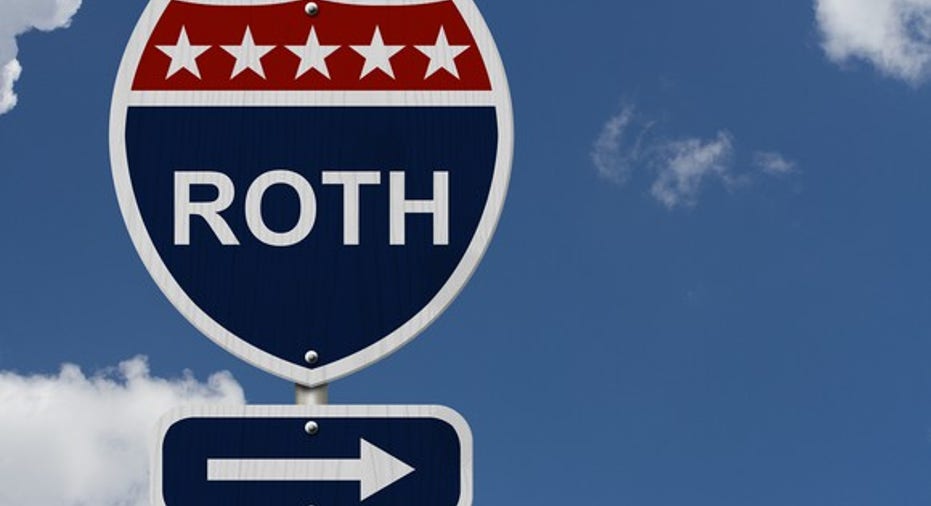Why a Roth IRA Conversion in 2017 Might Be Smarter Than Ever

Roth IRAs are one of the most powerful tools to save for retirement. Not only do they offer tax-deferred growth as long as you keep money in the account, but they also let you take withdrawals on a tax-free basis in most situations. Moreover, although income limits stop some people from contributing directly to a Roth IRA, there are no limits on the ability to do a Roth conversion from an existing traditional IRA. There are tax consequences to Roth conversions, but 2017 promises to be an interesting year on the tax front, and that could make converting to a Roth a better move this year. Below, you'll learn more about Roth conversions and why they make more sense than ever this year.
Image source: Getty Images.
The basics of Roth conversions
If you have traditional IRA assets, you can convert them to a Roth IRA at any time. Until 2010, there were income limits that prevented some high-income taxpayers from doing Roth conversions, but those limits were repealed to allow anyone to convert. The benefit of converting is that once money is in the Roth IRA, it gets all the tax benefits that Roth IRAs offer, including tax-deferred growth and tax-free withdrawals.
However, there's a price to pay for Roth conversions. To the extent that the traditional IRA was funded with pre-tax money -- which is the most common source for most savers -- you have to pay tax on the amount converted in the year of the Roth conversion. This acceleration of taxes is the major reason why most people don't think very seriously about converting to a Roth.
The key question on whether a Roth conversion makes sense or not is whether you think the tax rate you'll pay now on your converted IRA funds will be higher or lower than what you'd pay in retirement when you tap into a traditional IRA. In general, if your tax rates will be higher in retirement, converting is the best move. If your tax rates will fall, then waiting is typically the smarter move.
Why Roth conversions could be smarter in 2017
The reason why 2017 is looking a lot more favorable for Roth conversions has to do with the results of the recent presidential election. In early 2016, many expected a Democratic presidential victory, and proposals to raise taxes would have made the tax cost of Roth conversions even higher.
With the Republican victory for the White House, the odds are far better that income tax rates will fall in 2017. Republican Congressional leaders and President-elect Donald Trump differ on the details of their respective tax plans, but they both have simpler tax bracket structures that would reduce the top tax rate on income below current levels.
If you anticipate that your tax bracket is likely to fall under tax reform in 2017, then converting an existing IRA to a Roth will let you lock in those lower rates. Moreover, thanks to a special provision of Roth conversions, you'll be protected even if tax reform doesn't happen as quickly as lawmakers would like.
Don't like the Roth conversion? You can change your mind
When they made laws allowing Roth conversions, lawmakers added a provision that let people change their mind. By using the process of recharacterization, you can essentially undo your Roth conversion up until the final date, including extensions, when your taxes are due for the year. So if you're doing a conversion in 2017 and file for an automatic six-month extension next year, you can have until mid-October 2018 to recharacterize.
Recharacterizing involves having the financial institution that holds your Roth IRA take the necessary steps to undo the transaction. You'll need to return the amount converted to your traditional IRA, along with any earnings that it produced during the time it was in the Roth. Once it's done, though, you're treated as if the conversion had never happened.
That can be handy in two situations. First, if the value of your investments falls over the next year, then recharacterizing will prevent you from paying taxes on money that you subsequently lost. But equally importantly, if the tax reform efforts on which you based your conversion decision turn out not to happen, then you can recharacterize and wait until rates look more favorable.
Make your move now
Because of the recharacterization option, there's no reason to wait before doing a Roth conversion. If the benefits of converting to a Roth outweigh the tax costs in your own personal situation, then moving quickly to do your Roth conversion in 2017 could help you take maximum advantage of the power of the Roth IRA.
The $15,834 Social Security bonus most retirees completely overlook If you're like most Americans, you're a few years (or more) behind on your retirement savings. But a handful of little-known "Social Security secrets" could help ensure a boost in your retirement income. For example: one easy trick could pay you as much as $15,834 more... each year! Once you learn how to maximize your Social Security benefits, we think you could retire confidently with the peace of mind we're all after.Simply click here to discover how to learn more about these strategies.
The Motley Fool has a disclosure policy.



















